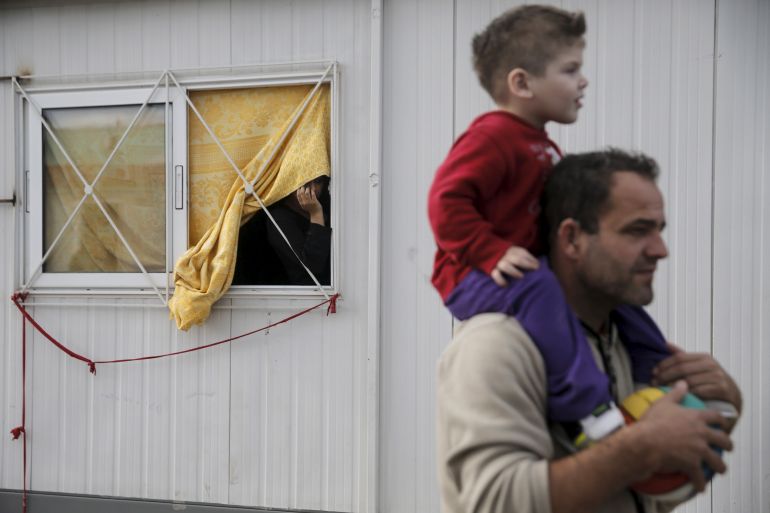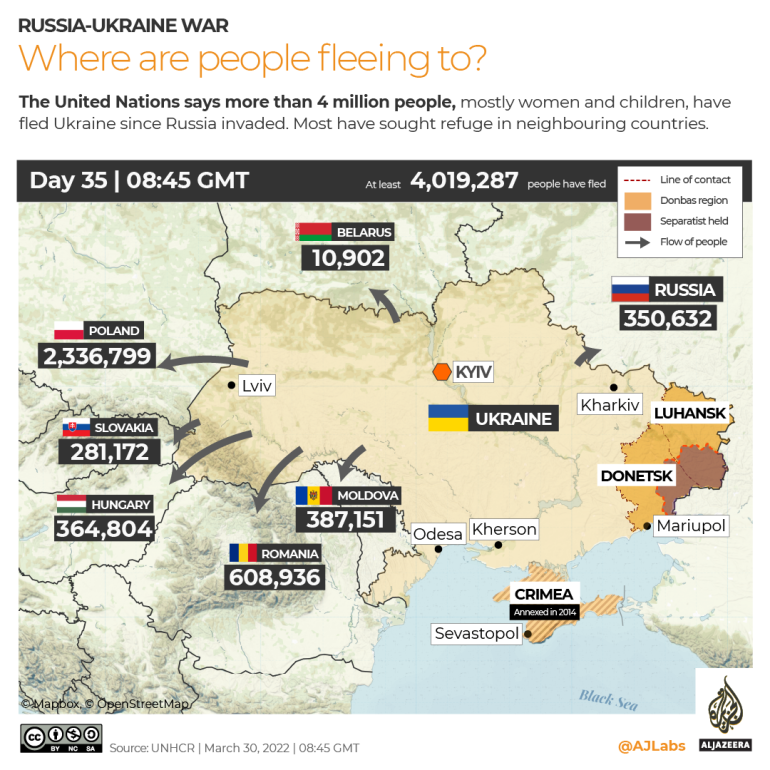Greece embraces Ukrainians as picture darkens for other refugees
Aid workers are particularly concerned for those fleeing countries other than Ukraine after a four-year-old Syrian boy died.

Athens, Greece – As Ukrainian refugees are bussed into Greece to receive a warm welcome by authorities, aid workers and asylum seekers have described to Al Jazeera a far bleaker environment for those seeking shelter having crossed Turkish borders.
They say people from other nations are essentially being treated as second-class refugees, and their concerns soared after the mid-March death of a four-year-old Syrian boy, following an alleged pushback.
Keep reading
list of 4 itemsWhy is Europe suddenly so interested in helping refugees?
What do Syrians think about the welcome for Ukrainian refugees?
‘It’s a miracle’: Poles open their homes to Ukrainian refugees
In that incident, a group of 30 Syrians were stuck on an island in the Evros river between Turkey and Greece for five days in plummeting temperatures.
The group said they had been pushed back to this island by Greek authorities. During this time, the four-year-old drowned in the river.
They were eventually rescued by Greek authorities on March 16 after extensive coverage in Greek newspaper Efimerida ton Syntakton and a legal intervention by Greece-based rights group Human Rights 360.
“We are very happy for the rescue of the 30 Syrian refugees that have been confined on an islet of Evros’ river on the Greek Turkish land border,” said Epaminondas Farmakis, co-founder and director of HumanRights360.
“The refugees, including two pregnant women and seven minor children, did not have access to the necessary means for their survival. They did not have access to water, food, medical care, or any means to keep warm, and they were exposed to the cold and humidity on the small islet in the Evros’ river for six days and nights,” he said.
“As a result of their illegal pushback, they reported the tragic drowning of the four-year-old – a son of one of the refugees.”
Farmakis said that they had managed to issue an interim measure through the European Court of Human Rights, the first time it has been issued in the Evros area.
“This time there was time for the court to act. In most cases of illegal pushback, estimated at 12,000 people last year, there is no time to react. Many lose their lives, and their rights are violated. We call on the Greek government to stop this illegal practice.”
Al Jazeera contacted Greek authorities for comment, but at the time of publishing had not received any response.

Joe Esquire (not his real name), 35, and originally from Congo, said he has noticed a more friendly welcome being put on for Ukrainians.
“There is a reality that we find unjust and unjustified, and that is the fact of directly granting asylum papers or residence documents to Ukrainian nationals as soon as they arrive, without any application procedure,” he told Al Jazeera.
“We all escape the dangers of mistreatment and wars in our respective countries. This is the cause of our refuge in Europe … to all benefit from international protection.”
Describing his EU-funded camp on the Greek island of Samos, he said, “This camp looks like a prison, especially since we are subject to checks at all times. We do not enjoy all of our freedom.”
Esquire said that the protection of Ukrainian refugees was important but wondered why the same procedures did not apply to all asylum seekers.
Greek Migration Minister Notis Mitarachi has repeatedly called Ukrainians “real” refugees, while asylum seekers from other countries on the Greek mainland are prevented from claiming asylum.
A legislative change last year reduced the ability of refugees on the mainland to register an asylum claim.
Now, they either have to prove a vulnerability, attend an asylum office with a police note saying their documents are verified – which according to those working on the ground is a discretionary process, or go to the Flyakio Reception and Identification Centre located in the Evros region of northern Greece.
NGOs such as Mobile Info Team, in Thessaloniki, said this has limited the capacity of asylum seekers to register a claim.
In recent weeks, Greek police have also been carrying out a so-called “sweep”, or roundup, in central Athens.
Authorised as an operation to target petty crime and drug dealers, officials said more than 2,500 people were “inspected”, 600 non-nationals were “detailed”, and 44 arrests were made.
It was reported that, in the same operation, 125 people without papers were taken to the Amygdaleza detention centre.
Several observers told Al Jazeera that they believe the operation mainly targeted people of colour.
“The Greek police’s current operation is both racist and unlawful,” said Lucy Alper, legal coordinator from Refugee Legal Support.
“Systemic failures and barriers within the Greek asylum system cause many people to be undocumented. It is harder than ever to register claims for asylum on mainland Greece, yet now police arrest people for not being registered.
“People imprisoned in detention centres face poor conditions and little or no access to legal aid. Proper access to asylum procedures and legal support is urgently required, not racial profiling and detention.”
Like in Greece, authorities in Poland have also been accused of welcoming Ukrainian refugees with open arms while trying to repel those from the Middle East, Asia and Africa.
At the same time, rights groups have long criticised Greece for what they view as criminalising humanitarian work, creating legal cases on trumped-up charges.
One of the most notable cases involves NGO workers Sean Binder and Syrian refugee Sara Mardini who were arrested on Lesbos in 2018 and are still to see their day in court.
Knut Bry, a celebrated Norwegian photographer who has volunteered extensively with NGO Lesvos Solidarity on Lesbos, is the latest humanitarian worker and journalist in a growing list to be arrested.
Bry appeared in court on March 21 accused of espionage after reportedly taking photos in Mytilene port, where military vessels are stationed, often next to fishing boats.
He was released on a 4,000-euro ($4,400) bail. The investigation is continuing.